
A Lost Generation
-
 John Mauldin
John Mauldin
- |
- July 27, 2013
- |
- Comments
- |
- View PDF
An Ugly Secular Trend in Part-Time Work
The Emergence of a US Underclass
A Lost Generation
Maine, Montana, and San Antonio
It is pretty well established that a tax increase, especially an income tax increase, will have an immediate negative effect on the economy, with a multiplier of between 1 and 3 depending upon whose research you accept. As far as I am aware, no peer-reviewed study exists that concludes there will be no negative effects. The US economy is soft; employment growth is weak – and yet we are about to see a significant middle-class tax increase, albeit a stealth one, passed by the current administration. I will acknowledge that dealing a blow to the economy was not the actual plan, but that is what is happening in the real world where you and I live. This week we will briefly look at why weak consumer spending is going to become an even greater problem in the coming years, and we will continue to look at some disturbing trends in employment.
Last week, I noted at the beginning of the letter that an unintended consequence of Obamacare is a rather dramatic rise in the number of temporary versus full-time jobs. This trend results from employers having to pay for the health insurance of employees who work more than 29 hours a week.
I quoted Mort Zuckerman, who wrote in the Wall Street Journal:
The jobless nature of the recovery is particularly unsettling. In June, the government's Household Survey reported that since the start of the year, the number of people with jobs increased by 753,000 – but there are jobs and then there are "jobs." No fewer than 557,000 of these positions were only part-time. The June survey reported that in June full-time jobs declined by 240,000, while part-time jobs soared 360,000 and have now reached an all-time high of 28,059,000 – three million more part-time positions than when the recession began at the end of 2007.
That's just for starters. The survey includes part-time workers who want full-time work but can't get it, as well as those who want to work but have stopped looking. That puts the real unemployment rate for June at 14.3%, up from 13.8% in May.
As it turns out, the unintended consequences of Obamacare are not the only problem. Charles Gave wrote a withering indictment of quantitative easing this week (which we will look at in a few pages) and included the following chart, which caught my eye. Note that the relative increase in part-time jobs began prior to Obama's even assuming office. The redefinition of part-time as less than 29 hours a week and the new costs associated with full-time employment due to Obamacare simply accelerated a trend already set into motion.
An Ugly Secular Trend in Part-Time Work
Look closely at this graph. It turns out the trend toward part-time employment started in the recession of the early 2000s, paused only briefly, and then really took off in the recent Great Recession. This is clearly a secular trend that was in place well before 2008.
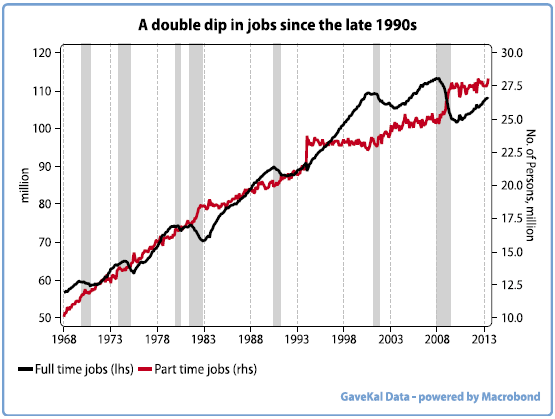
This development is very troubling, especially because it primarily affects young people and those with fewer skills. As I documented in letters last year, workers 55 and older are actually taking "market share" from younger workers. I went back tonight to see if that trend is still in place. The first graph below (the next few graphs are from the St. Louis Fed's FRED database) is one we are familiar with: the actual employment level over the last ten years. We are still two million jobs down since the onset of the last recession, some six years later. The only reason the unemployment rate has fallen at all is that several million people have simply left the labor force for one reason or another.
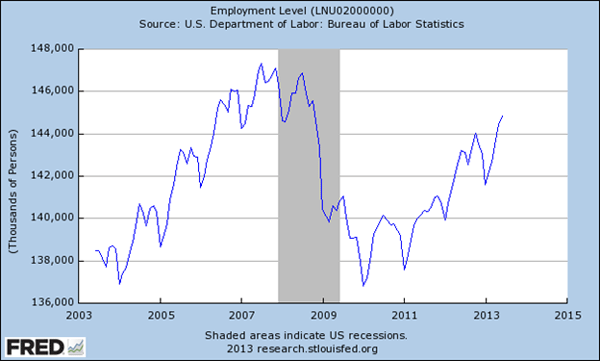
The next graph is the number of employed 25-54-year-olds. What you will notice is that the above graph shows about 7 million new jobs since the very bottom of the employment cycle, yet employment in the 25-54 age cohort has barely risen. Who got all the jobs?
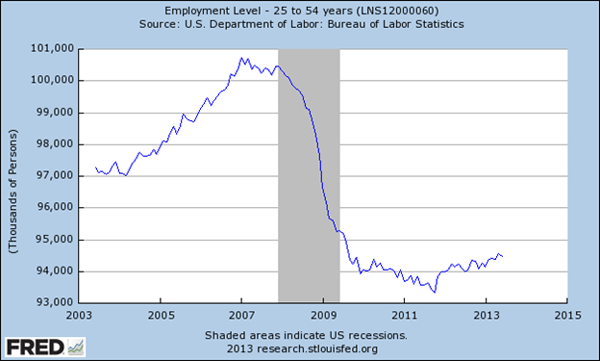
That mystery is solved courtesy of the next chart, which shows the number of employed in the 55+ age group. Even acknowledging that there is a growing Boomer population does not account for the rather spectacular increase in employment in the 55+ age group. Can you find the recession in this chart? If the St. Louis Fed hadn't shaded the recession in gray, you certainly couldn't find it in the data. Not only did Boomers see a rise in employment, they took jobs from younger groups. If you dig down deeper, you find that the younger you are, the higher the unemployment level of your age-mates. I will spare you that exercise, as this is already depressing enough, unless you are 55+.
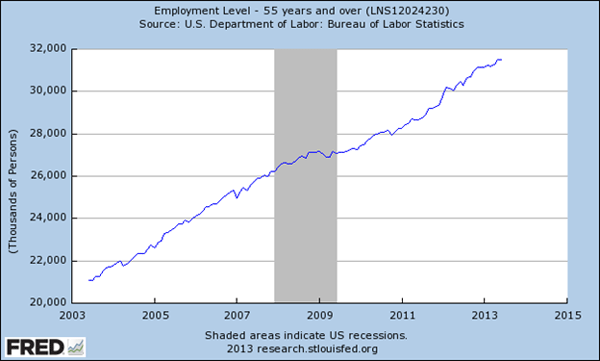
Note that I am not arguing that those of us over 55 should be put out to pasture. Many can't afford to quit working (especially when their kids are living with them!). I am just reporting on the facts. The only way to solve this is to grow our way out of it, yet whatever we are doing is not working.
The Emergence of a US Underclass
Let's turn back to my good friend Charles Gave's analysis, picking up in the middle of his work. He has divined a rather interesting reason for our current employment malaise. I am going to quote at length because this is just so good and deserves a wide audience in the current debate over monetary policy.
This chart [below] shows a steady increase in part time employment since the early 2000s back toward levels that persisted through the 1976-2001 period. The big change is the precipitous decline in full time jobs which started in 2002 and accelerated after 2008. It can be seen that the number of part time jobs has risen by 3mn, while full time jobs have decreased by a similar amount. This compositional shift is unprecedented.
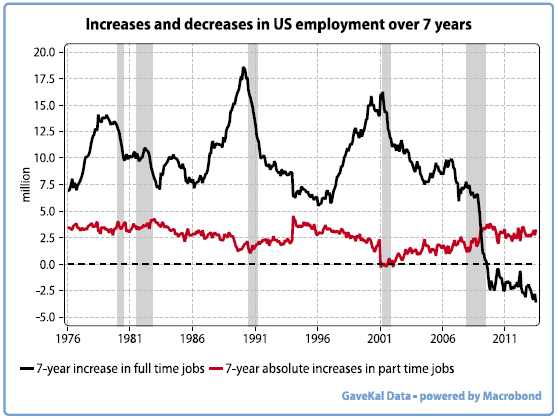
The next step is to measure the difference in job growth for part time and full time workers. This is done by comparing the rolling seven year series for each classification of jobs and noting the differential. As this gap widens in favor of part time employment, we would expect a greater share of the US labor force to be earning lower wages. To test this proposition we compare this seven year differential measure with the median income level for US households.
The results are quite striking. The correlation between our differential measure for the kinds of jobs being created and the real median income was 0.82 between 1974 and 2013; from 1997 to 2013 it moved up to 0.95. This matters because periods when individuals have stable full time jobs are associated with rising median income, while incomes tend to decline in an unstable job market.
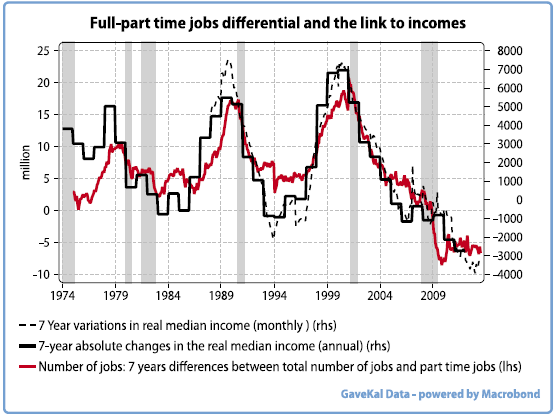
Put simply, median income has slumped because a very large share of Americans can no longer find proper jobs.
Behind this economic, political and social disaster, stand many factors such as technological change which has undermined traditional low-skilled employment and the rise of China as a fierce industrial competitor.
What is less well understood is the pernicious impact that US monetary policy has had on the US labor market.
A collapse in the US median income level has historically coincided with the Fed running a policy of negative real interest rates. The reason why unemployment tends to be lower during periods when capital has a real cost attached was explained in some detail in a piece written in early 2011. This dour relationship has been maintained over the last two years and median income has, as I suspected, continued to fall. Make no mistake, if monetary policy is not substantially changed, then median incomes will continue to fall.
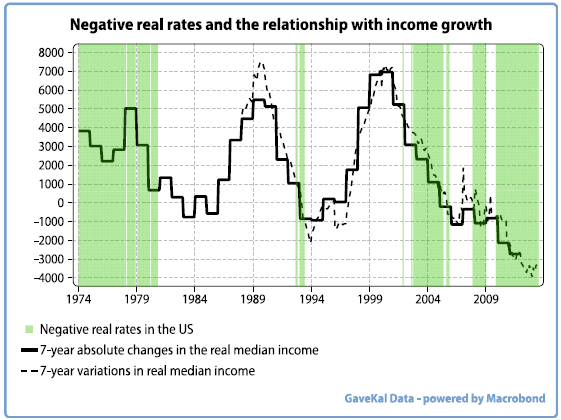
When poor people cannot earn a return on their savings or on their labor they remain trapped in poverty. The effect is to subsidize what are effectively overpaid financial jobs and undermine employment prospects within traditional sectors.
As a result, periods of negative real rates tend to be accompanied by the Gini coefficient rocketing higher. Today, this policy is effectively leading to the emergence of a poorly paid and chronically insecure "lumpen proletariat". At least half of the US population may be moving deeper into a poverty trap, which, over the long-run, must negatively impact consumption. Moreover, I never saw a structural bull market in equities take place against a backdrop of falling median income.
So why is Bernanke doing it? It would seem for the same reasons that the Japanese did 20 years ago. He is protecting not so much the banks as the bankers. To cut a long story short and to paraphrase a famous quote: What is good for the US Investment Banks is bad for America.
Bernanke's policies are aimed at guaranteeing the prosperity of this elite, and as such he has been wildly successful. Paul Volcker, arguably the best ever central banker, cared for the interests of ordinary people over those of investment bankers. By contrast, Bernanke has helped create his own "lumpen proletariat" and a parallel class of the "super-rich." This will have many consequences, not all of them pretty.
-
Marx is back! Class struggle will be the main political theme in the years to come. This is what happens when you entrust a common good such as money to an over educated technocrat who believes he is smarter than the markets.
-
In a democracy it is bad politics to follow a monetary policy which favors the rich and condemns the majority to an ever more difficult life (witness damages caused by the euro). This is the "Road to Serfdom" towards socialism or technocracy rather than a sustainable capitalist economy.
-
This system will become increasingly unstable: socially, financially, economically. Such unfairness breeds the conditions for political instability. Under similar circumstances, Theodore Roosevelt and the US Congress went after the "Robber Barons." Franklin Roosevelt acted 20 years later during the depression to separate commercial banks from investment banks. The obvious parallel in the crisis of our times is that President Obama is no Roosevelt.
- I have no idea how this problem is going to be addressed, but addressed it will be. My hope is that a normal monetary policy will resume in the near future lest we end up dealing with a vengeful demagogue some way down the line.
For this reason, I saw the potential for so called tapering as the first step towards a return to economic sanity (see Volcker's Return). Alas, I seem to have been wrong. Bernanke has the fortitude of a cheese cake, and once again, I misjudged him. The implications for job creation, fair income distribution and indeed the future prosperity of the US may be far reaching. I am worried.
A Lost Generation
We are watching the Fed employ a trickle-down monetary policy. They hope that if they pump up the banks and stock market, increased wealth will lead to more investment and higher consumption, which will in turn translate into more jobs and higher incomes as the stimulus trickles down the economic ladder. The kindred policy of trickle-down economics was thoroughly trashed by the same people who now support a trickle-down monetary policy and quantitative easing. It is not working.
We have a younger generation that is having trouble finding full-time work and developing the skills needed for the transition to more stable, higher-paying employment. The longer the situation persists, the more difficult making up lost ground and lost time becomes for them. As Charles wrote, we may be seeing a new underclass develop, which has disastrous implications for the country. This week President Obama gave a speech on the economy that sounded like a campaign speech except that he should not be running any longer. He blamed the rise of technology for the loss of jobs, the decimation of the power of unions for flat incomes, and the policies of his predecessor for the current malaise. The speech was a wish list of new programs and promises, yet nothing is getting done. He fails to engage with the most pressing problems of our time and doubles down on a healthcare plan that is a train wreck even his most ardent supporters are walking away from. Did you see the recent letter from multiple union leaders asking for a course correction on healthcare?
The Congressional Budget Office now estimates that 7 million people will lose their employer-provided health insurance at the end of the year. One would assume that those are almost all full-time workers. So instead of getting health insurance in some form as a benefit, they will likely soon be paying $1400 a year (minimum) in mandated taxes (the level set by the Supreme Court), and those costs will rise dramatically over the next few years, according to the current schedule. That is a HUGE tax increase for those people.
Young people who have no insurance and are making more than $10 an hour will be paying about $1300 a year, or close to 10% of their after-tax income. That blows a monster hole in their disposable income at those levels. There is no other way to look at this: it's a huge lower-middle-class tax increase. Yes, they get a benefit (health insurance) that someone somewhere in society was already paying for, but they personally did not have these costs before.
The unintended consequences of the healthcare bill are going to be vicious. Not only is there a tax increase on the rich and on small employers, there is a tax increase on young people and the middle class. And it's a tax increase that comes in the middle of the slowest recovery on record. It is possible that we grew at less than 1% this last quarter. And the burden piles on top of a secular shift in employment practices that is making life more difficult for the younger generations.
Like what you're reading?
Get this free newsletter in your inbox every Saturday! Read our privacy policy here.
We are getting close to the point where not only are there no good choices left, but the difficult choices are starting to look pretty bad indeed. And no one in DC is talking about the budgetary choices we are going to be forced to make. The recent drop in the deficit is temporary, fueled by people taking income in 2012 and paying taxes at a lower rate. That "tax dividend" is just about done. Deficits are going to be the number one topic in 2016, with jobs a close number two. Hide and watch.
Maine, Montana, and San Antonio
I have been in Newport, Rhode Island, at the Naval War College, where I attended a small Summer Study Group for the Office of Net Assessment for the Department of Defense. My mind is on overload trying to absorb all I heard and learned and to fit all that into my limited understanding of how the world works. It is a very complex world that the US military finds itself in. Shrinking budgets and an expanded menu of options and demands mean difficult choices. Factor in rapidly changing geopolitical and technology environments, and the challenges become even more complex. When I think of the limits our budget process is going to force on our set of choices, the situation does not make me comfortable.
The one thing that did make me feel good was the caliber of the people I met. They were most impressive. Admittedly, those in the room were among the best and brightest in the military; nevertheless, it was comforting to see the quality of thought and training going into the decision-making process. These are scholars with wide-ranging educational backgrounds as well as warriors proud of their service. I have to tell you, I do not get that same level of comfort when I am in a roomful of political leaders. There are some good ones but not enough of them.
I am in New York for a few meetings before I head on to Maine. My partners in Mauldin Economics, David Galland and Olivier Garret, will be here Wednesday; and as a special treat I get to have dinner with Jack Rivkin on Tuesday. I may even try to attend a meeting of the Friends of Fermentation if they allow teetotalers to show up. My youngest son, Trey, will fly up to meet me here, and we'll head north on Thursday morning. It will be good to be with friends and talk about the issues of the day at Leen's Lodge, amidst the beauty of Grand Lake Stream . Then I'll be home for a week before heading out to join Darrell Cain at his summer home in Montana. My fall schedule looks to be light on travel for some odd reason, and that's ok with me. I need some catch-up time.
And speaking of Mauldin Economics, I continue to be impressed by Grant Williams' ability to see through the smoke in the market today and pinpoint where it's headed. This skill lets him spot investment opportunities that others tend to overlook. You get his Things That Make You Go Hmmm… for free as a subscriber to my letters, but if you haven't yet subscribed to his excellent monthly advisory, Bull's Eye Investor, I recommend you do so. You can sign up now at a 50% discount by clicking this link: http://www.mauldineconomics.com/go/bwXwl/MEC
It is time to hit the send button. Have a good week and enjoy your summer. I intend to.
Your worried about the kids analyst,

John Mauldin
P.S. If you like my letters, you'll love reading Over My Shoulder with serious economic analysis from my global network, at a surprisingly affordable price. Click here to learn more.
Put Mauldin Economics to work in your portfolio. Your financial journey is unique, and so are your needs. That's why we suggest the following options to suit your preferences:
-
John’s curated thoughts: John Mauldin and editor Patrick Watson share the best research notes and reports of the week, along with a summary of key takeaways. In a world awash with information, John and Patrick help you find the most important insights of the week, from our network of economists and analysts. Read by over 7,500 members. See the full details here.
-
Income investing: Grow your income portfolio with our dividend investing research service, Yield Shark. Dividend analyst Kelly Green guides readers to income investments with clear suggestions and a portfolio of steady dividend payers. Click here to learn more about Yield Shark.
-
Invest in longevity: Transformative Age delivers proven ways to extend your healthy lifespan, and helps you invest in the world’s most cutting-edge health and biotech companies. See more here.
-
Macro investing: Our flagship investment research service is led by Mauldin Economics partner Ed D’Agostino. His thematic approach to investing gives you a portfolio that will benefit from the economy’s most exciting trends—before they are well known. Go here to learn more about Macro Advantage.
Read important disclosures here.
YOUR USE OF THESE MATERIALS IS SUBJECT TO THE TERMS OF THESE DISCLOSURES.
Tags
Did someone forward this article to you?
Click here to get Thoughts from the Frontline in your inbox every Saturday.

 John Mauldin
John Mauldin
